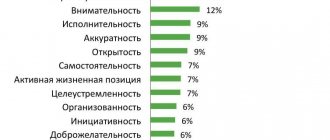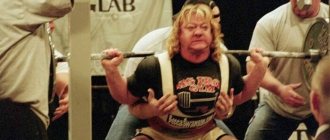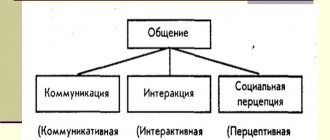But did you know that character strengths and weaknesses in a resume are an example of how to make a resume “sell”?
There is absolutely no need to wait for an interview - get ahead of the recruiter and increase your value right at the dating stage.
Let's look at how to do this correctly on your resume.
Let's look at the list of strengths and weaknesses that we recommend writing down in the main and additional blocks, and also get acquainted with the best examples that HR will definitely like.
1
What are a person's strengths and weaknesses on a resume?
Each person has advantages over others that he wants to indicate on his resume, and disadvantages that no one lacks, but it is better not to advertise them. It should be borne in mind that a person is not ideal and it would be wrong to collect only the strengths without mentioning the weaknesses.
At this point, the employer wants to see how adequately the person evaluates himself. Often a weakness can be useful for a particular profession. These personality qualities are closely related to each other and cannot contradict each other.
Often we try to highlight our advantages, but remain silent about our shortcomings. But only a self-critical, accomplished person can accurately highlight his weaknesses and not be afraid to say so.
You can find your strengths yourself, knowing your skills and talents, or ask those who see you from the outside - family and friends - to formulate them. The same can be done with identifying weaknesses. Their complete absence will tell the recruiter that you have not yet matured as a person.
Self improvement
Human shortcomings can only be overcome through constant development. Not only shortcomings, but also character strengths and talents cannot be ignored. They require improvement, because even the most outstanding abilities without daily training weaken over time.
Every person knows what he can do best. Therefore, only rare individuals do not pay attention to them and do not engage in self-development.
There are usually rarely problems with advantages. After all, there are a huge number of methods of self-development. And if desired, everyone can improve their abilities, make them brighter and more outstanding.
The situation is different with disadvantages. Everyone tends to downplay them in themselves. If you don’t see the problem, you can get along with it perfectly, but life will lose something important from this. You can stubbornly ignore your weaknesses and accept them, but developing as an individual and as a professional requires hard work.
Table of strengths and weaknesses
We have collected some character traits in the form of a table. It will help you determine how to list strengths and weaknesses in your resume.
| Strong | Weak |
| Tenacious and results-oriented | Too shy |
| Hardworking | You don't have willpower |
| Confident | Overly emotional, irritable and even aggressive |
| Sociable | You don’t know how to keep silent in time |
| Organized and independent | Hyperactive |
| Easily perceive new information and can work with large volumes of information | Are you afraid to travel on ships and aircraft? |
| Learn quickly | Principled |
| Responsible for their own actions and the actions of subordinate employees | You don't know how to be flexible |
| Disciplined | Overly self-critical |
| Active, energetic | Straightforward |
| Have organizational skills | Too proud |
| Punctual | Impulsive |
| Developed creative thinking | Supporter of formalism |
Match your strengths with those personality characteristics that will help you get the job you want. Please note that some of them, which seem like an advantage to you, may turn out to be a disadvantage for the applicant.
Read more - What weaknesses can be written in a resume?
# Advantages of your candidacy - what to write in the application form
A resume is an official document, often has a standard form and the same filling structure. Considering 50 applications for one position, the recruiter tries to choose a candidate who has at least the slightest advantage. Anyone who stands out positively among other applicants will get a chance to take a vacant job.
According to a study of the requirements that companies place on vacancies, most employers want to see the following positive aspects in applicants’ resumes:
# How to identify positive traits
Expert opinion
Ekaterina Troitskaya
HR manager
Self-critical, goal-oriented and independent people always recognize the presence of weaknesses in their character. And this is absolutely normal, because there are no ideal people. But many successful people are able to turn their negative traits into advantages by working hard on themselves.
The personality of each person is made up of strengths and weaknesses, which are closely dependent on each other. We try to show off useful features, but try to keep silent about flaws.
Example: in college you were always uncomfortable speaking in front of a large audience. But the thesis was completed independently and on time. This means that, despite your shyness or fear of public speaking, you can safely talk about perseverance, attentiveness, responsibility and hard work.
For those who are writing a resume for the first time, it is difficult to highlight the advantages. And once at the interview, the applicant begins to worry and demonstrate completely opposite characteristics. To avoid unpleasant moments, the applicant must analyze his character in detail:
- Start with talents and skills. Among them you will definitely find worthy qualities. Think about what you do poorly and what comes easy. In order not to forget anything, it is better to write it down on a piece of paper. Knowing your advantages, you will understand the direction of work to develop them.
- When it is difficult for applicants to single out the positive aspects on their own, friends and acquaintances - people who closely communicate with you - will come to the rescue. Listen to their opinion and advantages will open up before you, the existence of which someone had no idea, and someone needed to confirm their position and enlist support.
- Evaluate the people who surround you. Think about which traits help them in their work and which ones prevent them from moving up the career ladder. Compare which qualities you have. Highlight those that are considered strengths, and then highlight those that could be considered weaknesses.
Divide a sheet of paper into two columns. First, select the personal qualities that are most suitable for the vacancy. In the other - shortcomings that will least affect the work. Ready! But there should be fewer disadvantages than advantages, and all character traits should correspond to your personality.
# Relationship between character and vacancy
Most job seekers make the same mistake: they send the same resume to different vacancies. You shouldn’t do this, since each manager sees in his own way what skills and qualities will be required for the vacancy. It is important to be able to predict what kind of person management wants. You can find out if you read in detail the advertisement that the company publishes when looking for an employee.
Don't be fooled! For example: calm and reasonable people do not have leadership qualities. And if you cannot meet strict deadlines, do not write that you are in cahoots with discipline and punctuality.
Some positions require a person to have emotional balance under extreme working conditions, others require the ability of people to work independently, without waiting for instructions from management.
Some employers value honesty in a candidate, others the ability to make a bright and informative presentation, while others are interested in the ability to communicate with foreign partners or know business etiquette.
Expert opinion
Nikolay Borozdin
Director of a recruitment agency
Each position corresponds to a certain set of qualities: an accountant is characterized by patience and perseverance, a driver is characterized by composure and attentiveness, and activity and leadership skills are valued in a manager. Always compare the position and the character that suits it.
# How to stand out from other candidates
Try to find two features that will be especially useful in your future work and wrap them in a tasty wrapper. This formulation will tell you much more about you than a banal list of words that do not confirm anything.
The majority of applicants write the same thing on their resumes:
- Performance or responsibility
- learning ability or stress resistance,
- communication skills or determination,
- results-oriented or teamwork.
The above qualities cannot be considered strengths, since almost every applicant has them. There are no specialists who are able to admit their irresponsibility and inability to focus their activities on results. These virtues should be present in a person as a matter of course.
To outperform other candidates when describing your strengths, make them unique and break away from the template.
To be different from others, write differently:
- Remove all boilerplate words from your resume.
- Choose a couple of the most important advantages and comment in one sentence.
Example: creative (I always find and implement original ideas even for the most ordinary tasks).
Example: sociable (I find an approach even to children from disadvantaged families with a wounded psyche).
Example: punctual (I always and everywhere meet deadlines, complete assignments and submit reports, far ahead of others).
Strengths and weaknesses relative to the position
Each position has its own set of personality aspects that the employer pays attention to. It is very important to strike the balance that will make you the ideal candidate for the position.
Tables of strengths and weaknesses for each profession:
| Strong | Weak |
| Salesman | |
|
|
| Supervisor | |
|
|
| Manager | |
|
|
| Accountant | |
|
|
Read more - What can you write about strengths in your resume?
Developing your strengths
- Professionalism
One of the strengths of a person is the ability to improve in a chosen field. Experts recommend reading at least one book in your specialty every month.
- Analytical thinking, learning ability
These personality strengths are entirely dependent on the level of intelligence. It, in turn, is determined by genetic data and the training that has been received.
- Discipline
To increase your level of discipline, you need to learn how to motivate yourself.
- Hard work
Few people can boast that they have this quality from birth. A person starts work not because he is tired of idleness, but only because there is such a thing as “necessary”. Each completed action brings a feeling of satisfaction, which works as an excellent motivator.
- Patience
You can't get everything you want right away. Achieving a goal takes time. The ability to wait is a valuable character trait.
- Confidence, determination
These strengths come with acquired experience and skills. The more knowledge you have, the easier it is to follow your chosen path.
These human strengths can be supplemented by the following:
- Courage;
- Honesty;
- Responsiveness;
- Reliability;
People who have all these qualities can control their actions and desires and manage their lives.
Helpful tips on how to better understand your strengths and weaknesses
It's never easy to talk about your weaknesses. Therefore, when writing a resume and at an interview, it is better to answer this question by avoiding the following points:
- hide personal qualities that are unfavorable for yourself, for example, low self-esteem, hot temper, lack of self-confidence, inattention, etc.;
- the weakness should not concern professional competence.
Let this be a fairly minor negative characteristic that is not capable of influencing the decision to refuse the desired position. Carefully study the requirements for the vacancy and do not indicate everything related to the qualities and skills required for the job.
In general, when creating a resume, it is recommended to indicate universal strengths.
For example, always set goals and strive to achieve them.
This will show you as a goal-oriented person, ready to plan and achieve. Self-confidence will also have a positive effect on your grade and will speak of you as a person who is not afraid to move forward.
The ability to communicate with colleagues and clients (if the work involves communications) and responsibility are also important. Rather, these are the most necessary traits for any employee.
Always start with strengths
It is likely that during the interview the recruiter will ask you to describe your strengths . And he does this for a reason.
Naturally, he is able to read your “stress-resistant,” “cheerful,” and “team player.”
We hope you have read our guide and do not use adjectives, replacing them with cases.
He wants you to independently indicate to him which quality you personally consider the most valuable.
The problem arises: how to answer the question in such a way as to hit the bull's eye, but not seem boastful.
Instead of saying, “I'm detail-oriented and hard-working,” or simply listing your skills, you can create a clear, interesting way to present your strengths while highlighting the things that can benefit the company, and most importantly, the vacancies.
Remember how we talked about how your skills will have to be tailored to the job requirements?
First, evaluate this list of strengths and try them on for yourself:
- Creativity;
- Multilateral development;
- Flexibility;
- Ability to focus on a task;
- initiative;
- Honesty;
- Devotion;
- learning ability;
- Self-control.
But simply specifying them as adjectives is not only insufficient, but incorrect. The recruiter will not appreciate your subjective opinion and will skip the entire proposal.
That's why:
- Select the most valuable skill required for the job. For example, for a sales manager this is the ability to find a common language with people.
- Justify it by giving examples from practice. We wrote about this in our guide.
Where to write strong character traits on a resume
With an interview, everything is clear: you were asked - you answered.
Where should you indicate your character strengths and weaknesses on your resume? There are no special blocks for this.
Correct answer: wherever you can.
Having chosen the most important skill or quality for the vacancy, touch it in the blocks:
- "Goals",
- "Experience",
- "Skills"
- "About Me",
- in the Covering Letter.
Just don't be too intrusive.
For example
Let's say you want to work as a cold sales manager. Your main job responsibility is to find points of contact with customers. It is logical that your strengths are communication skills, the ability to persuade, and find an individual approach to each person.
And your resume will then look like this:
Resume template
Exercises to identify strengths and weaknesses
Identifying personality characteristics is never an easy task. Therefore, it is necessary to carefully weigh all the strengths and weaknesses at the stage of preparing a resume, then this information will be useful for the interview. First make a list of them as follows:
- Analyze your character traits in detail. Think about what you can do most easily and what requires effort. Write down the qualities required to complete these tasks.
- Reach out to friends and family for help. They will point out the advantages and disadvantages, because from the outside they can see better.
- Evaluate all the qualities you wrote down on the sheet. Sort them according to the principle of advantage - disadvantage. For example, you prepared for a presentation, selected all the material, designed it, but were unable to speak. On the part of the performer, you approached the matter responsibly, were attentive and diligent. But from the leadership side, you cannot speak to the public.
- Identify the qualities of the applicant for the position and write them down.
- Compare your characteristics with those required for the required vacancy.
- Evaluate the result, determine your shortcomings and the ability to cope with them.
Checklist for resume
During all recruitment procedures, basic personal and professional qualities are of great importance. An HR specialist does not know each candidate personally, so he can only get a first impression from a well-written resume. Accuracy is important in this matter. You should not indicate too many or few positive qualities. It is also not recommended to indicate standard cliches or simply repeat the information specified in the vacancy. HR specialists will immediately notice this, and the chances of getting a job will drop sharply.
Note! The resume should consist of the most understandable and clear formulations and descriptions.
The most effective resume is one that links a person's strengths with professional achievements and business acumen.
A certain area of business has its own specifics and characteristics. A resume should be tailored to meet the requirements for each position and specialty. For example, for such professions the following advantages are valued:
- the secretary must have patience, attentiveness and accuracy;
- for an accountant, perseverance and scrupulousness are important;
- High-level communication skills and stress resistance are valuable for a sales manager;
- Managerial employees must have responsibility and dedication.
A well-written resume is one of the most important aspects of finding a job. The first thing the employer will see is this document. Whether an applicant is invited to an interview depends on whether the employer likes the content. However, most applicants have no idea what qualities are best to write in order to differentiate themselves from other competitors and establish themselves well.
Engineer
Personal characteristics that are desirable to be displayed in a resume for the position of engineer:
- attentiveness;
- perseverance;
- high concentration on the task;
- responsibility;
- good organization;
- discipline;
- Possession of a technical mind.
Salesman
The seller must have:
- high politeness and developed diplomacy;
- the opportunity to listen and understand;
- sociability;
- ability to work as a team;
- positive attitude;
- hard work;
- self confidence;
- positivity.
Lawyer
Lawyers are subject to some of the most stringent requirements for personal qualities. This is due to the need to be able to solve other people's problems. Must have the following properties:
- attention to detail;
- developed logic and deduction;
- stress resistance;
- self-confidence;
- sociability;
- the ability to speak and write clearly, to convey your thoughts clearly and clearly.
Accountant
A specialist in this field must have:
- attention to detail;
- high performance;
- perseverance;
- organization;
- scrupulousness.
Sales manager
For employees of this specialization, it is important to have good communication skills, literacy and good pronunciation, initiative, the ability to multitask, the ability to think outside the box and have a presentable appearance.
Supervisor
For senior managers, it is necessary to have flexible thinking, organizational skills, multitasking, perseverance, observation, demanding and efficient. The ability to make quick decisions and result orientation are valued.
Driver
An employee of the presented specialty is valued for:
- politeness;
- attentiveness;
- communication skills;
- prudence;
- resistance to stress.
Administrator
The most important qualities for the position:
- positivity;
- the ability to quickly adapt to unusual situations;
- communication skills;
- ability to learn;
- literacy and speaking skills;
- initiative.
Typology of characters
The most popular is the typology proposed by the German psychologist Kretschmer. In his opinion, a person’s character types depend on the characteristics of his figure and physique.
Types of character according to Kretschmer
- "Picnics" . Outwardly, these are dense people who tend to be overweight, of short or medium height, with a large head, short neck and small facial features. From a psychological point of view, such people - cyclothymics - are emotional, easily make contact, and quickly adapt to new circumstances and living conditions. It is in this category that people prone to manic-depressive syndrome are most often found. In this article, read about disharmonious personality development.
- "Athletics" . Outwardly, these are tall people with broad shoulders, strong muscles and chest. From a psychological point of view, people of the “ixothymic” type are practical and reserved. Character weaknesses - power, inability to show emotions and adapt to new circumstances. With complex psychological disorders, such people develop epilepsy.
- "Asthenics" . People of this type can be recognized by their thin physique, underdeveloped muscles, long legs, arms and elongated face. Psychological type - schizothymic - they are characterized by stubbornness, isolation and inability to adapt to life circumstances. People of this psychological group are prone to schizophrenia.
Character types in Jung's classification
Another classification was proposed by the Swiss psychiatrist Carl Gustav Jung. The dominant criterion of the typology is the dominant emotional functions - feelings, intuition, thinking and sensations. In his opinion, in every person, to a certain extent, the external or internal world prevails. In this regard, Jung classifies people into two types - introverts and extroverts.
Introverts are closed, focused on their inner world, and deliberately isolate themselves from external circumstances. They tend to analyze events, worry, listen to personal feelings and value their health. It is difficult for such people to meet people and change habits.
Extroverts are direct, open to communication, and active. They have many friends, because the worst thing for an extrovert is loneliness. My favorite hobby is traveling, and my favorite way to relax is to spend time with friends, tell jokes and, of course, become the life of the party.
Character types by temperament
Another common classification is the comparison of a certain temperament with specific individual qualities. In this case, you need to take into account that in everyday life it is impossible to meet a person with pronounced traits of a particular temperament. People are more likely to have mixed types of temperaments.
- Choleric - he is characterized by such manifestations as impetuosity, speed of decision-making, passion and imbalance. What character traits require correction - emotional imbalance and fatigue. Cholerics tend to quickly get carried away and waste their energy irrationally.
- Phlegmatic - unhurried, emotionally stable, does not show emotions. What are the dominant qualities - perseverance, poise, productivity and diligence in work.
- A melancholic person is a person who tends to worry about every even minor event. Character weaknesses - emotional vulnerability, excessive impressionability.
- A sanguine person is an active, “alive” person with frequent mood changes. What character traits are dominant - reacts quickly to all events, easily experiences troubles. He has expressive facial expressions and high productivity at work, provided that the task at hand is interesting to him.
What weaknesses should you mention at an interview?
As you already know, you will be asked to answer several difficult questions throughout the interview. By now you should have a clear answer to the question “What are your strengths?”, but what do you say when asked to describe your obvious weaknesses?
After all, you will appear arrogant if you say you have no weaknesses, but if your answer contains too many negative qualities, you could jeopardize your chances of getting the position. You need to appear humble and willing to learn without scaring off the hiring manager with a weakness that you can't overcome.
Researching weaknesses and preparing an answer is paramount to acing an interview. When thinking about your weaknesses, it is important to choose qualities that you are actively working on or demonstrate steps you are taking to overcome that weakness. Telling a story or how you are working to address this weakness can only strengthen your argument.
If you can't identify your weaknesses, reach out to a friend or close colleague to see where you can improve. Always remember that weaknesses are not permanent and just because you have a few weaknesses does not mean you are doomed. The ability to identify areas for improvement demonstrates that you are a well-rounded candidate.
Knowing how to answer the question “what are your weaknesses?” will help you succeed in your job search. If you have trouble writing an answer to this question, read some examples in the next chapter. Apply the same structure to your answers about professional qualities.
Examples: How to answer a question about strengths
1) I like to test the software that my company is starting to use. I like to go long and diligently through the sections and links of the new program to learn more useful functions. In fact, just last week I discovered a problem with our internal project management and progress tracking software. I immediately contacted tech support and they fixed it right away. This position will give me the opportunity to apply my passion and help you improve programs for your company.
2) I have always preferred to work in teams and have found that my collaborative nature is one of my greatest strengths. On the projects I led, I pushed myself so hard that I inspired the rest of the team, which helped us all achieve our goals much faster. In fact, in two years I increased our department's productivity by 10%.
3) I always catch myself thinking that my pronounced strength is the ability to write well and quickly. I work well under pressure and have never missed a deadline. One specific example that comes to mind is when I was asked to complete a project two hours before the magazine went to press because... my colleague got very sick. This was the most difficult part of the article. I had to muster all my organizational skills and complete the project on time. I subsequently learned that this article was very well received by our readers.
4) I am new to the finance industry, but I find that I am good with numbers and I really enjoy it. I love helping people save money and finding new investment opportunities for my clients. I enjoy learning about their needs and finding ways to help them achieve their desired lifestyle, and I have helped my clients collectively increase their net worth by 10%.
5) I am a sensitive person who knows how to communicate with people and understand their needs. Last summer I completed an internship at a company in the customer support department. I once took a call from a dissatisfied customer who had lost a significant discount from the company. Although the company could not find a solution for it, I suggested other workarounds that could somehow help satisfy the request. As a result, the client was satisfied with the option found. I understand the importance of satisfied clients, so I always try to be optimistic and problem-solving oriented.
6) I believe that my strength is the ability to quickly and effectively solve problems that arise. I can see any situation from different perspectives and this is my unique trait to get the job done even under difficult conditions. Solving problems makes me an excellent communicator because... I am comfortable communicating with both senior managers and team members. I believe that my ability to see all sides of an issue will allow me to become a valuable asset to your company.
7) I know this industry very well. Having worked in sales and marketing for over 15 years, I know that I have the skills to thoroughly study the market and find niches that increase company profits. For example, when I joined my current company, its sales were gradually declining, but under my leadership over a couple of years, I was able to increase revenue by 7% in the first year and 5% last year.
 My most valuable asset is my work ethic and my willingness to step in when necessary. I'm not afraid to take on a difficult client or finish a project that no one else wants, because those are the things I get the most rewarding experience from. I generally like to work outside of my daily responsibilities, finding niches where I can still be useful. All this helps me adapt to any situation and achieve the best result for the company.
My most valuable asset is my work ethic and my willingness to step in when necessary. I'm not afraid to take on a difficult client or finish a project that no one else wants, because those are the things I get the most rewarding experience from. I generally like to work outside of my daily responsibilities, finding niches where I can still be useful. All this helps me adapt to any situation and achieve the best result for the company.
As you can see, being able to tell a story in your answer gives you an edge over the competition. If you can articulate your strengths in case studies, it will greatly help you in your job search.
If you're having trouble finding your strengths, ask a close friend or former colleague to help you, or use the annual company performance review report that your bosses often provide. You can also refer to our article “How to recognize your strengths and talents for career development” .
How to Avoid Patterns
A template is always bad. Most applicants write the same thing on their resume:
- diligence;
- responsibility;
- communication skills;
- teamwork;
- focus on results.
The recruiter is looking for the best candidate, not the average one who blends in with the gray mass. Therefore, recruitment specialists do not recommend using hackneyed formulations such as “communication skills”, “performance”
. These patterns are already considered bad manners and have become the butt of jokes among employers. It is preferable to replace them with simple but concise phrases: “I easily find a common language”, “I do the work efficiently and on time”, “I don’t miss deadlines”, “I show initiative and am responsible for the result”, etc.
Resume template










